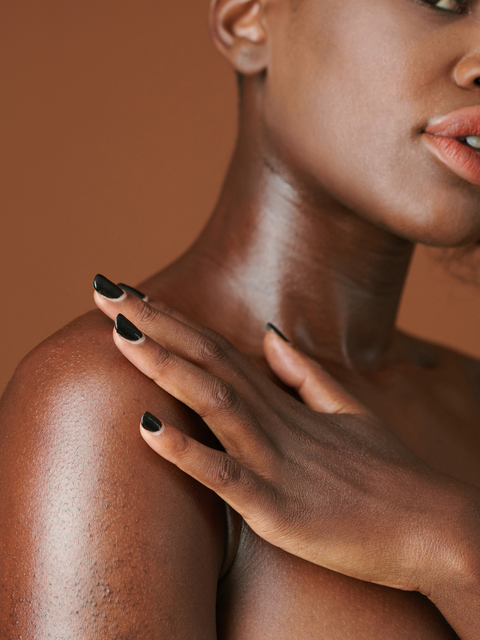
Everything You Need To Know About Body Oil
Key Takeaways:
- Body Oil Offers Deep Hydration: Body oils penetrate deeply, locking in moisture and improving the skin’s texture, making them ideal for all skin types.
- Organic and Sustainable Options Are Readily Available: Organic and sustainably sourced body oils provide nourishment while supporting eco-friendly beauty practices.
- Body Oils Are Versatile for Any Skincare Routine: Body oils can be used post-shower, mixed with lotions, as bath oils, or for targeted hydration, making them a flexible addition to your skincare regimen.
Have you ever struggled to find a moisturizer that truly hydrates without feeling heavy or greasy? Or maybe you've tried countless skincare products that promise soft, glowing skin but fall short when it comes to delivering long-lasting results. At Sacred Rituel, we understand the journey toward finding effective, clean skincare solutions — because we’re more than just a skincare brand; we’re committed to offering products that honor both your skin and the environment.
In this guide, we’ll discuss everything you need to know about body oil — from its benefits to choosing the right one for your skin type. If you’re ready to transform your skincare routine with natural, organic body oils, you’re in the right place.
Exploring Body Oils
Body oil is a lightweight, moisturizing product typically made from a blend of natural oils, such as coconut, jojoba, or almond oil. Its primary function is to hydrate and nourish the skin, helping to lock in moisture and improve the skin's texture. Unlike lotions, which often contain water and other additives, body oils are usually free from fillers, making them a more concentrated form of hydration.
These oils work by mimicking the skin’s natural lipid barrier, which helps to protect against moisture loss. Whether applied after a bath, mixed with lotion, or used during a massage, body oils are known for their ability to leave the skin feeling soft, supple, and rejuvenated. They can also be infused with essential oils to add therapeutic benefits, like relaxation or energizing properties, depending on the blend.
Sacred Rituel’s Body Oil is crafted from a luxurious blend of organic oils, including jojoba and rosehip, designed to deliver intense hydration without any greasy residue. It penetrates deeply to nourish and protect, transforming your skin’s texture and leaving it silky smooth. Elevate your skincare routine with Sacred Rituel—discover the power of pure, concentrated hydration today.
Benefits Of Using Body Oil
Using body oil as part of your skincare routine offers several notable benefits. Here are some of the key advantages:
Deep Hydration
Body oils are highly concentrated, allowing them to penetrate deeply into the skin's layers, providing hydration that lasts significantly longer than most traditional lotions. Because they mimic the skin's natural lipids, body oils replenish moisture effectively, making them ideal for combating dryness and dehydration. This makes them particularly beneficial for people with dry or flaky skin, as they not only moisturize but also help to repair the skin’s natural barrier.
Improves Skin Texture
Regular application of body oil can result in noticeable improvements in skin texture, making it feel softer and more supple over time. Oils like argan and jojoba are rich in essential fatty acids, which help to nourish the skin and enhance its elasticity, promoting a smoother appearance. These oils also contain vitamins that boost skin health, encouraging a natural, healthy glow that lasts.
Locks In Moisture
Body oils excel at creating a protective barrier on the skin’s surface, effectively sealing in moisture and preventing water loss. When applied to damp skin, the oil combines with the residual water to enhance hydration levels, ensuring the skin stays moisturized for hours. This barrier also shields the skin from external aggressors, such as pollution and harsh weather, which can further dry out or damage the skin.
Rich In Nutrients
Many body oils are packed with antioxidants, vitamins, and essential minerals that provide crucial support for skin health and repair. Oils like almond and rosehip oil are especially high in vitamin E, which is known for its anti-inflammatory and protective properties that help to repair and protect the skin from free radical damage. Additionally, the presence of vitamins A and C in oils like rosehip can aid in collagen production, which is essential for maintaining firm, youthful skin.
Non-Greasy Finish
While it might seem counterintuitive, body oils can leave a non-greasy, silky finish on the skin when applied correctly. Lightweight oils such as grapeseed and jojoba absorb quickly, delivering moisture without leaving a heavy residue, which is especially beneficial for those who dislike the sticky feeling some lotions can leave behind. By using just a few drops and massaging it well into the skin, you can enjoy hydration without any lingering greasiness.
Versatility
One of the greatest benefits of body oils is their versatility, as they can be used in various ways to enhance your skincare routine. They function effectively as a standalone moisturizer, but they also make excellent massage oils, providing glide and hydration for a relaxing experience. Additionally, body oils can be used as bath oils to soften the skin while you soak, or even as a targeted treatment for particularly dry areas, making them a multifunctional product for your skin's needs.
Different Types Of Body Oils
Body oils come in a variety of types, each offering unique benefits depending on their ingredients. Here’s an overview of some of the most popular types of body oils you’ll come across:
- Coconut Oil: Known for its deep moisturizing properties, coconut oil is rich in fatty acids that help soften and hydrate the skin. It’s especially beneficial for dry or sensitive skin, but it can also be heavier and might not be suitable for oily skin types.
- Jojoba Oil: Jojoba oil is a lightweight oil that closely mimics the skin’s natural sebum, making it suitable for all skin types, including oily and acne-prone skin. It absorbs quickly without leaving a greasy residue and is known for its balancing and nourishing effects.
- Argan Oil: This luxurious oil, often referred to as "liquid gold," is packed with vitamin E, antioxidants, and essential fatty acids. Argan oil is ideal for anti-aging purposes, as it helps to reduce the appearance of fine lines, boost elasticity, and improve overall skin texture.
- Almond Oil: Sweet almond oil is gentle and highly moisturizing, making it a great choice for sensitive skin. It’s rich in vitamins A and E, which help soothe and nourish the skin, leaving it soft and supple.
- Grapeseed Oil: A lightweight and fast-absorbing oil, grapeseed oil is high in linoleic acid and antioxidants. It’s perfect for oily and acne-prone skin because it helps regulate the skin’s natural oil production while providing hydration.
- Rosehip Oil: Rosehip oil is celebrated for its regenerative and healing properties, thanks to its high content of essential fatty acids and vitamins C and A. It’s ideal for reducing scars, hyperpigmentation, and other skin imperfections, making it a favorite for those looking to improve skin tone and texture.
Each of these oils offers its own set of benefits, so choosing the right one often depends on your skin type and specific skincare needs.

Choosing The Right Body Oil For Your Skin
Selecting the right body oil depends largely on your skin type and individual skincare concerns. Here’s a guide to help you choose the best option:
For Dry Skin
If you struggle with dry, flaky skin, opt for richer oils like coconut, avocado, or almond oil. These oils contain fatty acids that deeply hydrate and form a protective barrier to lock in moisture. They are perfect for keeping your skin soft and nourished throughout the day.
For Oily Or Acne-Prone Skin
Those with oily or acne-prone skin can still benefit from body oils, as long as they choose the right ones. Jojoba oil and grapeseed oil are great options because they are lightweight, non-comedogenic, and help balance the skin’s natural oil production without clogging pores.
For Sensitive Skin
Sensitive skin types should look for oils that are gentle and soothing. Almond oil and chamomile-infused oils are good choices due to their calming properties. Always make sure to choose fragrance-free and organic oils to avoid irritation.
For Aging Skin
If your goal is to address signs of aging, such as fine lines, loss of elasticity, or dullness, opt for oils that are rich in antioxidants and vitamins. Argan oil, rosehip oil, and pomegranate seed oil are known for their anti-aging benefits, helping to improve skin texture and reduce the appearance of wrinkles.
For Combination Skin
If you have combination skin, you might want to mix oils or choose one that offers balanced hydration without being too heavy. Jojoba oil is a versatile option that works well for this skin type, providing moisture where needed without making your skin feel greasy.
Organic And Sustainable Body Oil Options
As more people become conscious of what they put on their skin, the demand for organic and sustainable body oils has grown significantly. Here are a few things to consider when looking for body oils that align with clean beauty principles:
Certified Organic Ingredients
Organic body oils are made from ingredients grown without synthetic pesticides, herbicides, or GMOs. Look for certifications like USDA Organic, Ecocert, or COSMOS Organic, which ensure that the oil is truly organic. Oils like organic jojoba, coconut, and argan are commonly available in certified organic versions.
Sustainably Sourced
Sustainability involves not only how the ingredients are grown but also how they are harvested and processed. Choosing oils from brands that practice fair trade and use sustainable harvesting methods helps support ethical practices that protect the environment. For example, argan oil sourced from women’s cooperatives in Morocco is a great option for those seeking sustainability.
Cold-Pressed Or Unrefined Oils
Cold-pressed oils are extracted without the use of heat, which helps retain more of the nutrients and beneficial properties of the oil. Unrefined oils are also processed minimally, preserving their natural color, scent, and nutrients. These oils are less likely to contain harmful additives or chemicals, making them a better choice for clean beauty enthusiasts.
Eco-Friendly Packaging
Consider body oils that come in environmentally friendly packaging. Many sustainable beauty brands offer glass bottles, biodegradable packaging, or recyclable containers to minimize their environmental impact.
Avoid Harmful Additives
When choosing an organic body oil, it’s important to avoid products that contain synthetic fragrances, parabens, sulfates, or other harsh chemicals. Clean body oils should have simple, minimal ingredient lists, focusing on natural and safe ingredients.
Incorporating Body Oil Into Your Skincare Routine
Adding body oil to your daily skincare routine is simple and can enhance your skin’s hydration and overall health. Here are some practical ways to seamlessly incorporate it into your regimen:
Post-Shower Hydration
One of the most effective times to apply body oil is right after a shower or bath, as the warmth of the water opens up your pores, allowing the oil to penetrate more deeply. When your skin is still damp, gently massage the oil in circular motions to ensure even distribution. This helps to lock in moisture, keeping your skin hydrated and soft for the rest of the day.
Layer With Lotion
If you prefer a lighter texture or are looking for an extra hydration boost, try mixing a few drops of body oil with your favorite body lotion. This combination gives you the richness of an oil with the quick absorption of a lotion, leaving your skin feeling soft and nourished without any heaviness. Plus, layering products like this can enhance the moisturizing effects, especially in dry climates or during winter months.
Use As A Massage Oil
Body oils are excellent for massages, as they provide a smooth, luxurious glide that allows for easy, tension-relieving movements. Whether it’s a quick hand or foot massage or a full-body treatment, the oil hydrates the skin deeply while you relax. The act of massaging with oil not only enhances circulation but also delivers beneficial nutrients directly to the skin, leaving it feeling rejuvenated.
Target Dry Areas
You don’t have to apply body oil all over; it can be used to treat specific dry spots like elbows, knees, and heels, which tend to need extra moisture. Applying oil to these areas helps soften the rough patches and improve texture over time. Body oils are also ideal for areas prone to chafing or irritation, as they can soothe and protect the skin throughout the day.
Overnight Treatment
For an intensive skin treatment, apply body oil before bed and let it work its magic overnight. This approach is particularly beneficial during colder months or when your skin feels especially dry, as the oil will have hours to fully absorb and restore your skin’s moisture levels. By morning, you’ll wake up with noticeably softer and more hydrated skin, ready to take on the day.
As A Bath Oil
Adding a few drops of body oil to your bathwater transforms an ordinary bath into a spa-like, skin-nourishing experience. As you soak, the oil disperses in the water, allowing your skin to absorb moisture while you relax. Be sure to rinse the tub afterward to avoid any slippery residue, but you’ll step out feeling silky smooth and pampered.

Final Thoughts
Body oil is a versatile and powerful addition to any skincare routine. Whether you're looking for deep hydration, a way to improve your skin’s texture, or a sustainable skincare option, body oils provide an all-natural solution. With a wide range of oils available — from lightweight jojoba to rich coconut — you can find the perfect match for your skin type and needs.
By incorporating body oil into your daily routine, you’ll not only nourish your skin but also support more sustainable and organic beauty practices. So, whether you’re looking to combat dryness, enhance your skin’s glow, or simply indulge in a luxurious self-care ritual, body oil can be a game-changer.
Read also:
- Cruelty-Free Skincare: Top Products To Try
- Best Natural Skin Products For A Healthier Glow
- Look For These Ingredients When Shopping For Natural Sunburn Relief
Frequently Asked Questions About Body Oil
Can body oil replace lotion?
Yes, body oil can replace lotion for many people, as it provides deep hydration. However, some may prefer to layer both for extra moisture.
Is body oil better than lotion for dry skin?
Body oil is generally more effective for dry skin since it penetrates deeper and locks in moisture longer compared to water-based lotions.
How often should you use body oil?
You can use body oil daily, especially after a shower when your skin is damp, to maintain hydration and softness.
Can you use body oil on your face?
Yes, some body oils are suitable for facial use, but it's important to choose non-comedogenic oils like jojoba or argan to avoid clogging pores.
Does body oil help with stretch marks?
Certain body oils, like rosehip or almond oil, can improve skin elasticity and help reduce the appearance of stretch marks over time.
Can body oil be used in the summer?
Yes, lightweight oils like grapeseed or jojoba are perfect for summer, as they hydrate without feeling heavy or greasy in warmer weather.
Is body oil good for eczema-prone skin?
Yes, natural oils like coconut or jojoba can soothe and hydrate eczema-prone skin, but it’s important to patch-test first to avoid irritation.
Can body oil cause acne?
Certain oils can cause acne if they’re too heavy for your skin type. Always choose non-comedogenic oils if you’re acne-prone.
Sources:
- Purnamawati, S., Indrastuti, N., Danarti, R., & Saefudin, T. (2017). The Role of Moisturizers in Addressing Various Kinds of Dermatitis: A Review. Clinical Medicine & Research, 15(3-4), 75–87. https://doi.org/10.3121/cmr.2017.1363
- Lin, T.-K., Zhong, L., & Santiago, J. (2017). Anti-Inflammatory and Skin Barrier Repair Effects of Topical Application of Some Plant Oils. International Journal of Molecular Sciences, 19(1), 70. https://doi.org/10.3390/ijms19010070
- Michalak, M., Pierzak, M., Kręcisz, B., & Suliga, E. (2021). Bioactive Compounds for Skin Health: A Review. Nutrients, 13(1), 203. https://doi.org/10.3390/nu13010203







Comments (0)
There are no comments for this article. Be the first one to leave a message!